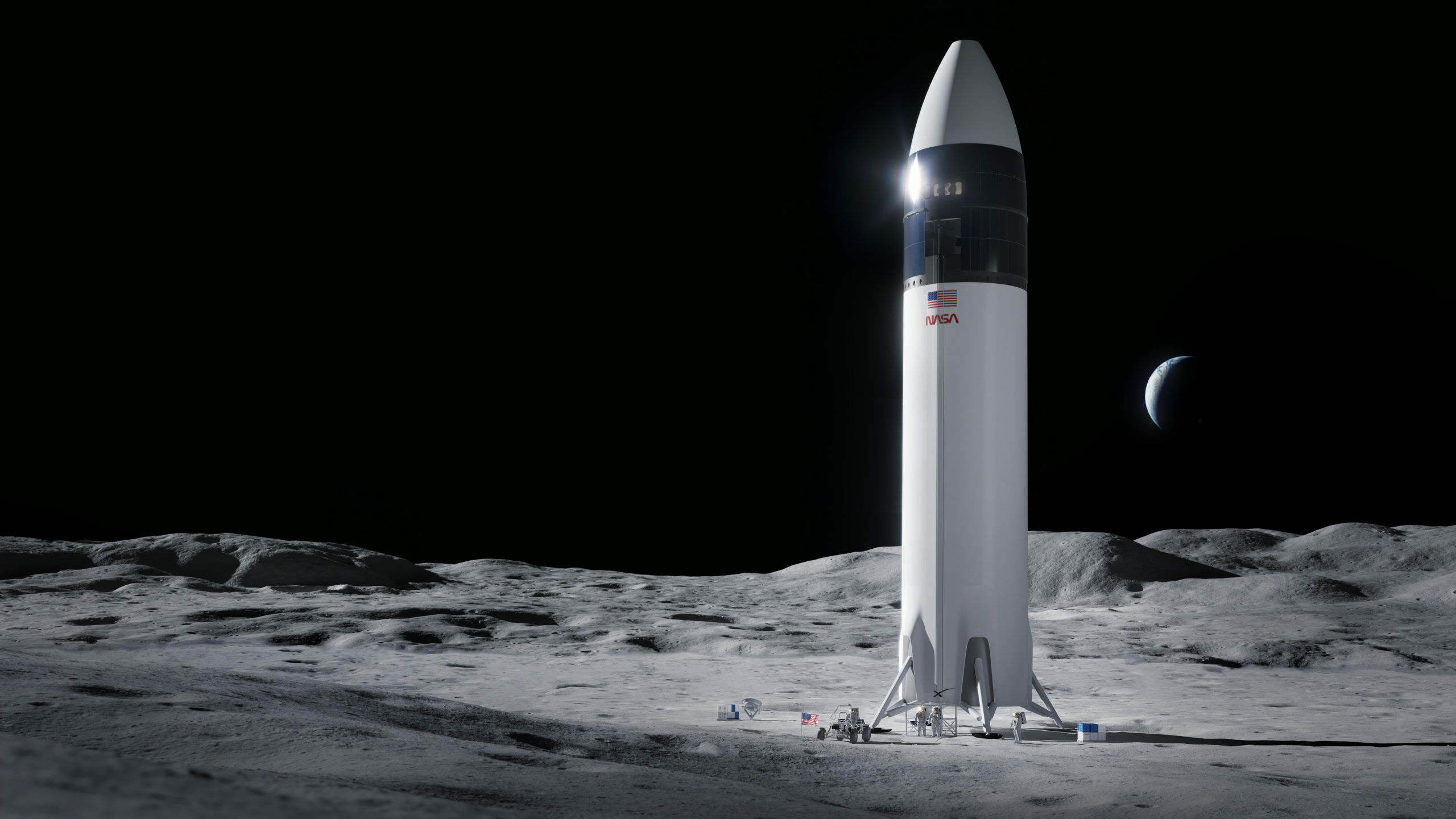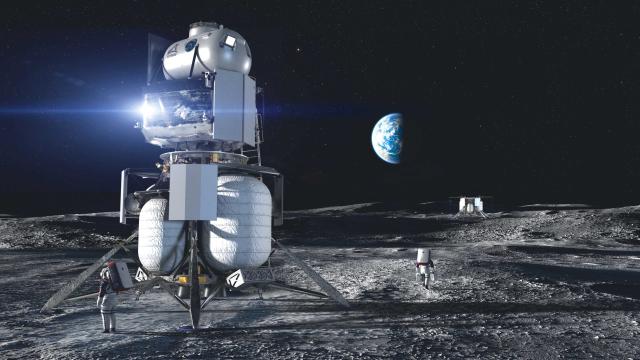Last week, NASA selected Elon Musk’s SpaceX over two other contenders to build the upcoming Artemis lunar lander. Blue Origin, founded by Amazon CEO Jeff Bezos, has now filed an official protest against the decision, in a development that’s bound to intensify this long-standing rivalry.
Blue Origin filed its complaint yesterday to the federal Government Accountability Office, an agency that scrutinizes services for Congress. The 50-page protest shows that Jeff Bezos and his aerospace partners aren’t backing down from this decision without a fight.
In an emailed statement, Blue Origin said NASA “executed a flawed acquisition for the Human Landing System program and moved the goalposts at the last minute.” It was a “high risk” selection, quoting NASA’s own words, and the decision “eliminates opportunities for competition, significantly narrows the supply base, and not only delays, but also endangers America’s return to the Moon,” according to the Blue Origin statement. It’s for these reasons that Blue Origin filed a protest with the Government Accountability Office.
Blue Origin, in partnership with Lockheed Martin, Northrop Grumman, and Draper, had been in the running against SpaceX and Dynetics to build NASA’s next human landing system for the upcoming Artemis missions to the Moon. In May 2020, NASA awarded Blue Origin $US579 ($746) million to move its project forward, while Dynetics received $US253 ($326) million and SpaceX $US135 ($174) million.
Blue Origin seemed the logical choice. The company had been independently working on a lander since 2017; its design choice for the lander seemed sensible and safe (if not overly conservative); and its three industry partners have accrued tons of experience in the aerospace industry. But NASA went with SpaceX, awarding a $US2.9 ($4) billion contract to the Elon Musk-led company.
For the lunar lander, SpaceX will use Starship, a launch system currently being tested at the company’s facility in Boca Chica, Texas. Several prototypes have gone through high-altitude flights, but all tests so far have ended in explosions. The next generation of Starship prototypes is now in the works, with SN15 performing static fire tests yesterday in preparation for another high-altitude test launch.
Under the current plan, NASA is to deliver two astronauts — a man and a woman — to the lunar surface at some point in 2024. A NASA Space Launch System (SLS) rocket will deliver an Orion crew capsule to space, while a SpaceX Super Heavy will do the same for Starship. After rendezvousing in lunar orbit, the crew will enter into Starship and descend to the Moon’s surface. Starship will then return the crew to the Orion capsule, which will carry them back home.
For NASA, a key goal — aside from landing astronauts on the lunar regolith — is to make these trips sustainable and set the stage for a permanent human presence on the Moon. The space agency, working under tight budgets, is collaborating with private partners to turn this vision into a reality. That SpaceX and Blue Origin are in the mix is hardly surprising: Musk and Bezos have exceptionally deep pockets, and both are fixated on expanding humanity’s presence in space.
This mutual desire, it would seem, has resulted in a rather heated rivalry — a rivalry in which Bezos has continually met with frustration. In 2013, SpaceX defeated Blue Origin in a bid for access to NASA’s Launch Pad 39A, and earlier this year Bezos, through Amazon’s Project Kuiper, filed a complaint about SpaceX’s request to the Federal Communications Commission for permission to place its Starlink satellites in lower orbits than originally planned.
— Elon Musk (@elonmusk) April 27, 2021
Musk’s response to the latest protest is typical of what we’ve come to expect from the billionaire. “Can’t get it up (to orbit) lol,” he tweeted out in response to a query from New York Times reporter Kenneth Chang. Musk was referencing the fact that Blue Origin has yet to place a rocket in Earth orbit, which is technically true (Blue Origin’s New Shepard makes trips to suborbital space, and the New Glenn two-stage rocket isn’t expected to launch until next year). Not content to stop there, Musk rehashed a modified image of a Blue Origin lunar lander mockup, displaying the inscription “BLUE BALLS.”
Musk must feel entitled to gloat like this given his apparently cosy relationship with NASA. The reliable and reusable Falcon 9 rocket is frequently delivering NASA cargo to space, while its CrewDragon is now delivering astronauts to the International Space Station on a regular basis. Blue Origin, by contrast, still has lots to prove — though its three partners in this lunar lander project are super legitimate. At the same time, the SpaceX solution to the lunar lander presents a very risky strategy. Musk’s company must now go about the business of proving unproven technologies, such as refuelling a rocket in space (never been done before), performing the vertical landing of a rocket on the lunar surface (also never been done before), and then taking off again (you get the picture).

Regardless, Blue Origin isn’t giving up the fight, and the company still wants a chomp of that Artemis pie. The company is claiming that it has been wronged by NASA and that the space agency needs to make amends.
What’s interesting here is that Blue Origin might actually have a case.
During the bidding process, NASA indicated its “intention to make two awards,” but due to “perceived shortfalls in currently available and anticipated future budget appropriations,” the space agency decided to go with a sole provider, according to the Blue Origin protest letter. The company argues that NASA’s decision threatens to eliminate competition and effectively locks down “immediate and future lunar landing system development and launch and lunar landing opportunities.”
Blue Origin is essentially claiming that NASA’s decision will lead to a kind of monopoly as far as the development of lunar landers goes, despite the space agency’s claims that other vendors will be sourced further down the line as the Artemis project evolves.
Blue Origin pegged the price of its lander at $US5.99 ($8) billion, while the cost of SpaceX’s lander is less than half of that at $US2.91 ($4) billion. Bob Smith, CEO of Blue Origin, claims that NASA allowed SpaceX to renegotiate the price but did not extend the same courtesy to Blue Origin, the New York Times reports.
The company is also claiming that the selection process was botched, as NASA changed the rules of the game late in the process, which it did “due to its undisclosed, perceived shortfall of funding for the multi-year program lifecycle,” as Blue Origin wrote in its protest letter, adding that NASA’s evaluation of the Blue Origin proposal was “flawed and unreasonable.”
Indeed, in its source election statement, NASA claimed that Blue Origin’s “proposal has merit and is largely in alignment with the technical and management objectives set forth in the solicitation.” Despite this, the space agency did not choose Blue Origin for the contract because its proposal “does not present sufficient value to the Government when analysed pursuant to the solicitation’s evaluation criteria and methodology.”
NASA is not currently responding to media requests on the matter, claiming it “cannot provide further comment due to pending litigation.”
Money, as is so often the case, seems to be the deciding factor here. The Government Accountability Office will now take all of this into consideration and decide if NASA somehow acted improperly during the selection process. The agency has 100 days to make its decision on the matter. Tough to know how things might go, but Bezos’s lunar lander might yet get another chance.
